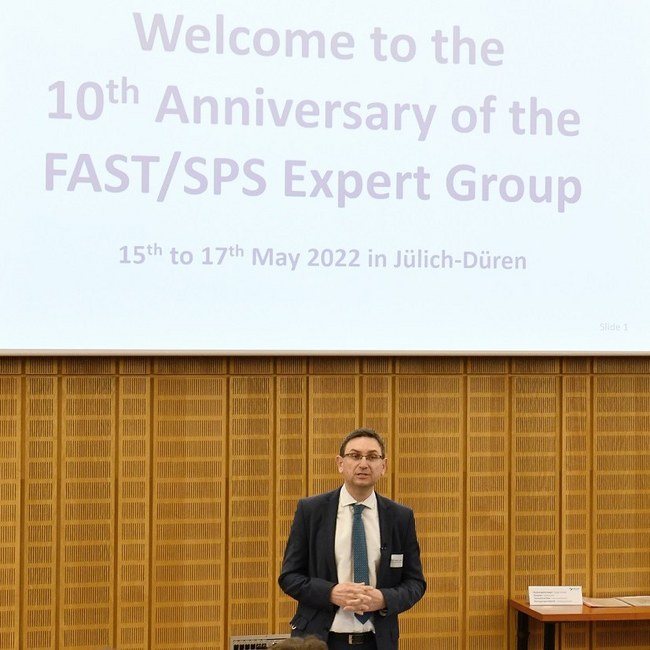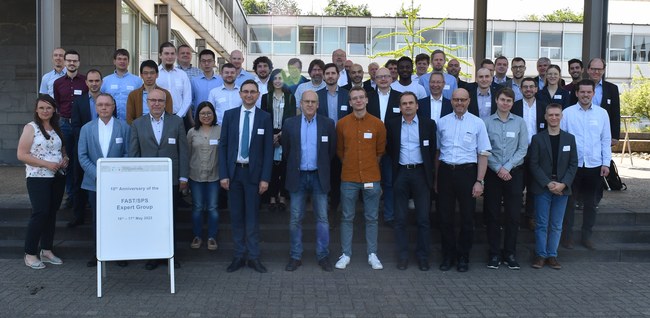

After the welcome address by Prof. Olivier Guillon and Prof. Christoph Broeckmann in the name of the joint comittee powder metallurgy, the first day started with a keynote talk presented by Prof. Claude Estournès (CNRS CIRIMAT, Toulouse). He gave an insight into different strategies to develop components with tailored properties via FAST/SPS.
The next presentation was given by Dr. Alessandro Fais (EPoS Technologies SA, Villaz-Saint-Pierre). He discussed the influence of the extremely high heating rates during Electro-Sinter-Forging on the diffusion mechanisms. Thereafter, Dr. Thomas Herisson de Beauvoir (CNRS CIRIMAT, Toulouse) introduced the influence of the sintering pathway on the formation of grain boundaries, grain growth and densification in 3YSZ and compared Flash Spark Plasma Sintering (i.e. ultrafast SPS) with conventional FAST/SPS. This first block of lectures was concluded by Dr. Oliver Levano Blanch (University of Sheffield) who kindly filled in for his colleague James Pepper. He shared results on the influence of current induced thermal profiles in titanium during FAST/SPS processing.
The second session of the day focusing on industry contributions started with a presentation of Romain Epherre (Norimat, France) who reported about the progress in digitalization by introducing the concept of a digital twin in FAST/SPS. The ENGEMINI software developed by Norimat will be launched within the next weeks and will be the first commercial software enabling customers to model temperature distribution during FAST/SPS.
Benjamin Luthardt (FCT Systeme GmbH, Rauenstein) summarized the latest trends towards the industrial application of FAST/SPS. He presented a FAST/SPS system in combination with active cooling to enhance the productivity. Gerhard Weber (Dr. Fritsch Sondermaschinen GmbH, Fellbach) discussed the progress in mold and process design for enhancing the tolerance against mismatch in coefficient of thermal expansion (CTE). As one example, he presented hot ejection of the central pin of a ring geometry reliably avoiding failure of the mold.
The last talk of this session was given by Damian Karpowicz (GeniCore Dp. Z.o.o., Warsaw). He introduced several examples for industrial applications of U-FAST (U stands for “upgraded”), where heating is based on a pulsed DC current with unique pulse shape. U-FAST is applied for production of mining tools and luxury goods. In general, FAST/SPS offers multiple advantages to conventionally sintered materials, such as longer lifetime, higher surface quality and quicker machining.
The afternoon session started with a presentation by Shufan Wang (RWTH Aachen University), who compared two novel sintering techniques (ultrafast high temperature sintering -UHS- and flash sintering) with respect to temperature distribution and grain growth by FEM modelling. Afterwards, Maria Wisniewska ((Łukasiewicz Research Network – Poznań Institute of Technology) introduced the manufacturing of sputter targets via FAST/SPS on an industrial scale.
Furthermore, Dr. Miguel Lagos (Tecnalia, Derio) reported about progress in using FAST/SPS for the synthesis of ceramics and metal-ceramic composites for electronic applications.
The next presentation was given by Dr. Martin Ihrig (Forschungszentrum Jülich) who summarized the progress in developing garnet-based all-solid-state lithium batteries (ASSLiBS) using FAST/SPS. A specific feature was the application of Mo-based TZM tools, which enabled pressures beyond 400 MPa. Jonas Heldt (Fraunhofer IPA, Stuttgart) introduced the project EMSiG. In an ambitious collaboration with industrial partners, FAST/SPS is intended to be used to synthesize ASSLiBS on an industrial scale.
Prof. Alexander Laptev (Poznań Institute of Technology, formerly Forschungszentrum Jülich) concluded the first day with a presentation on FAST/SPS of gadolinum doped ceria, which can be used e.g. as ceramic electrolyte in solid oxide fuel cells (SOFCs) operated at intermediate temperatures < 600°C. He highlighted the risk of chemical expansion and resulting cracking inherent to reducing conditions in FAST/SPS.
Afterwards, the participants had the possibility to visit industry booths and take part in the poster session. Furthermore, a guided tour to IEK-1 was offered. Amongst others, the three FAST/SPS devices and the instrumented electro-sinter-forge were presented. The first day ended with a joint dinner at Dorint Hotel Düren, where the participants could exchange in a casual setting.
The second day started with a keynote lecture by Dr. Dariusz Garbiec (Łukasiewicz Research Network – Poznań Institute of Technology). In his talk he demonstrated the potential of FAST/SPS as an effective technique to produce components for highly demanding applications in space industry.
Thereafter, Simon Graham (University of Sheffield) presented how FAST/SPS can be effectively used to process aluminium powders that are out of size specifications for usage in additive manufacturing.
Prof. Martin Bram (Forschungszentrum Jülich) presented promising results in the field of flash spark plasma sintering of NdFeB magnet materials. Flash SPS is a novel rapid densification method that offers new possibilities to tune the microstructure. The first session of the day was concluded by Dr. Oliver Levano Blanch (University of Sheffield), who reported about the processing of a low-cost titanium feedstock via FAST/SPS.
Unfortunately, the 2nd session had to be rearranged on a short notice. The presentation of Prof. Andrey Ragulya (Frantsevich Institute for problems in Materials Science NAS of Ukraine) and Dr. Abdullah Riaz (University of Rostock) had to be cancelled due to technical and personal reasons.
Nevertheless, Dr. Marco Cologna (European Commission, Joint Research Centre, JRC) presented the latest trends on FAST/SPS in nuclear materials research.
The last presentation was given by Dr. Danny Kojda (Helmholtz-Zentrum Berlin). He presented results on the modeling and characterization of the temperature-dependent thermal conductivity in porous silicon-aluminum processed by FAST/SPS.
![[Translate to English:]](/fileadmin/_processed_/f/0/csm_logodgm-4_b2722eeace.png)
![[Translate to English:]](/fileadmin/user_upload/logodgm-4.png)